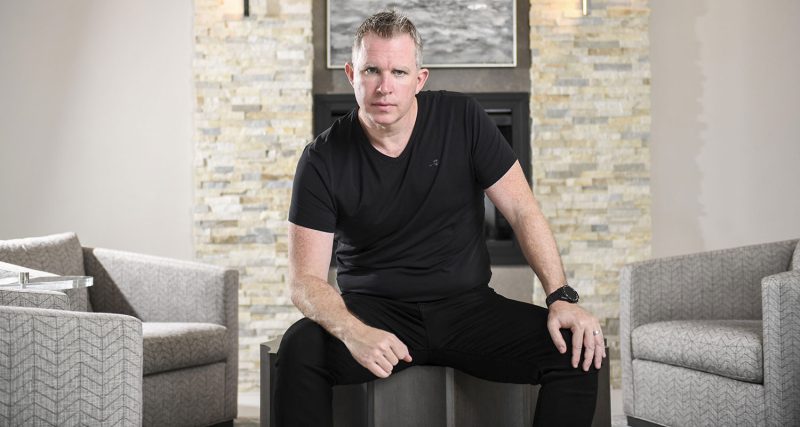As the Managing Partner at CIG Capital, Charles D. Carey is no stranger to the hard work and dedication that goes into building a successful business. By the age of 10, Carey had realized his innate ambition and the importance of dedication and a strong work ethic, collecting cans and bottles for their deposit refund, selling magazines and running a paper route. At 16, he saw the ROI potential in his first car, a rusted, hand-me-down Chevrolet Cavalier, which he remodeled and sold for seven-times its worth. By 22, Carey had started his first company, eventually making his first million by the age of 30.
Now, with the hard-earned monikers of serial entrepreneur, investor, venture capitalist and project financier under his belt, Carey is dedicating his career to helping others finance, manage, and realize the potential of their own projects through CIG Capital, an alternative investment firm.
Charles, you are a “serial entrepreneur, investor, venture capitalist and project financier, managing a portfolio of over $4 billion”. How did you get your start as an entrepreneur and what led you to the investment world?
Since I was little I always enjoyed doing things that others were not willing to do or take the risk on. I had the same mindset when starting my first business in my early 20s. I was not willing to allow those that said I couldn’t succeed stop me and showed them that it can happen. My saying is, “call those things that are not as though they were”. It’s a mindset of having faith with substance.
I started investing at a young age when I was just 22. I did daily stock trading. My first investment was into a computer store of one of my top managers at one of my companies. He had the dream of owning his own computer store. I always say, I invest into people not just businesses.
Your entrepreneurial spirit started early in life. How did your desire to make money at a young age influence your business acumen and work ethic as you got older?
Things were not handed to me. I remember wanting the new stuff other kids had and most of the time my parents couldn’t buy them for me. So, I started finding ways to make money, so I could buy them for myself. As I got older, I held to this understanding that I could acquire anything, I just had to find a way to get to it. Nothing was out of reach. To this day, I can always find a way to turn a situation into a win-win; deals my partners might deem dead, I can revive and turnaround.
Charles, you started your first company at the age of 22. Can you tell us about that company and what you learned from owning a business at such a young age?
It was a commercial maintenance company. I remember when we were obtaining new accounts, I would never tell anyone I was the owner since I was managing the accounts as well as owning them. I gave myself the title of general manager, because of how young I was and being that my employees were always older than me. I learned you don’t have to be the guy or the big boss. That’s why I believe I had more people respect me because of the way I carried myself at a young age. Thus, one of my principals is humility.
Carey began forming CIG Capital in 2011, then known as the Carey Investment Group or cigcap.com. By 2013, CIG and its partners were providing business consultancy services to companies with a specific focus on business loans.
Noticing funding issues as a recurring obstacle for many small businesses, with traditional loans taking far too long for owners to receive necessary funds, Carey formed Business Union Financial bufinancial.com, also known as BUF, in 2014. Built on the number one CRM system, the customized, problem-solving loan originator, processor and servicer created and implemented livefintech.com, an underwriting predictive risk-modeling algorithm capable of streamlining business loan applications to provide funding in as little as 48 hours. This algorithm is now responsible for the provision of underwriting and risk assessment for CIG Capital.
By 2016, as new working relationships and partnerships were created – allowing for significantly larger projects to be funded – Carey saw the need for a new partnership group. He brought together a range of top industry professionals and CIG Capital, as it’s now known, was formed.
Today, the company holds over 85 years of combined professional experience, and provides funding for projects from $20 million to more than $5 billion. While CIG Capitals’ growth was rapid, it wasn’t necessarily unexpected, with Carey attributing much of his success to following three simple principles.

You are a managing director at a finance company CIG Capital. Why did you create the company?
We created a one of a kind type product for projects and businesses that needed funding.
To provide funding where most banks or restricted financial institutional groups can’t provide the necessary funding for such large projects. With the blend of risk (equity and debt) of each project, we are able to fund projects 100%.
What are some of the projects that CIG Capital are currently working on? How big are the projects CIG Capital works on?
Glimpse Aviation, Magnifica Hotel and Resorts, Sheraton Hotel, Biodiesel Fuels, Grand Navarre Development, Gala Health Center, and NMRW Infrastructure Water Project are a few of the companies that we have worked with. The projects average over $400 million per project but we also have projects as small as $20m and as large as $2 billion and expect to hit over $10 billion portfolio by the end of 2020.
You have experience in business and brand development. How does this improve your work as a managing director in the financial world?
This is probably our greatest advantage when it comes to our business model. Since we take equity in almost every project we fund, we are responsible to help manage the project with our partners. This helps us decide if a project has the ability to meet its objectives, actually make it to market and be successful.
Charles, you have a strong philosophy when it comes to investment. Can you share your philosophy with us?
We don’t invest into projects we invest into people. When we underwrite a project, one element of the underwriting scoring model that I created (CIG’s 7 elements of predictive risk modeling) is based on the individual owner or developer of the project. Relationships are more important than transactions.
It’s undeniable there are many lessons to be learned in starting and growing any business, let alone multiple businesses. As a serial entrepreneur, Carey has picked up a plethora of knowledge throughout his journey, which can be distilled into three main principles he lives and works by: The three Rs, relationships, and investing in others.
Carey believes if anything is worth doing, both in business and in his personal life, it has to provide a balance of the following three returns: Return on Investment (RoI), Return on Time (RoT), and Return on Enjoyment (RoE).
The concept behind this is simple; every action an individual takes should have a purpose, and none should be prioritized over the other. Business owners, and everyone, really, should strive to have a purpose behind each action, asking questions like, will this action go towards making me money? (RoI); Is this a productive use of my time? Or will this time spent mean anything? (RoT) And; Does this give me a sense of enjoyment or purpose? (RoE).
According to Carey, the key to success and fulfillment in both professional and personal life is striking a balance between the three, and if any actions don’t provide at least one of these three returns, it’s probably not worth doing.

How did you come up with your 3 Rs for investing?
The Rs are crucial for life. One of my favorite words is balance. The Rs are something I live by not just in regards to investing. I feel that people do not always balance out their lives, thus they are less successful in life. I don’t invest into a project just because of the money it will make. It has to be something that we will enjoy long term and will be worth our time. In business and personal life, this is my model. Yes, sometimes buying a McLaren will not get any type of ROI since that car depreciates so fast. But the ROE that you get going 0-60 miles per hour in 2.3 seconds is something you can’t replace.
What are some of the wealth management tips you can give individuals new to managing their wealth and finances?
I’m not in the wealth management business field, but the things I’ve learned on personal wealth management is again, balance. If you risk it all and are at an older age, will you be able to earn it back? If you only low risk invest or if you bury your money, then expect to have value later with inflation that will devalue the currency at rapid rate since the derivatives are so high (inflated balances sheets). Money needs to be worked. How you do that is based on each individual’s purpose and where they are at in life. For me, I do say I lean more on the risk side since I’m only 42, but I do like a balanced portfolio to hedge my bets. I personally like the derivative markets but won’t put all my eggs in that basket. My example is this, I have equity in all types of projects; as mentioned earlier, we are in many sectors. We have service businesses that assist these businesses that I own. We earn interest on all these projects on the debt servicing. With our partners we also leverage the notes in the derivative markets. Bottomline, we balance out our investments.
Throughout life, humans are exposed to all kinds of relationships, both personal and professional, and it’s through these relationships that Carey believes success can be found.
Relationships can generally be separated into three categories: close relationships with family and friends, relationships with people you work with, and relationships with people who work for you. But what are the keys to a successful, fulfilling and ultimately beneficial relationship? According to Carey, all relationships, both personal and professional, should be based on three characteristics: hunger, zeal, and humility.
These characteristics are essential because they leave little room for ego, which often gets in the way of productivity. Think about it – if a shared hunger exists in relationships, people are more likely to work together to achieve an outcome, regardless of whether it’s personal or professional. If zeal, or passion, is shared, people are likely to encourage and motivate one another by their energy alone. Finally, if humility is shared, both people in the relationship understand that no task is below themselves, and will get their hands dirty – through hard work – in the spirit of progress.
According to Carey, if a relationship is lacking any of these three characteristics, it’s not likely to last in the long-term, or worse, it could lead to both personal and professional stagnation. As such, it’s important for people to assess their relationships to identify whether these traits are shared.

Charles, how would you describe your career as an entrepreneur?
Busy! I have the freedom to do what and when I want to do it. I do not work nine to five. But this also means more responsibility. I work every day of the week, sometimes only one hour, or sometimes 12 hours and even in the middle of the night. I don’t stop and this is important. You must be a self-starter and have self-discipline and balance out the time with family and friends.
Usually when investments are discussed, it’s in terms of monetary return and value. But according to Carey, one of the most important investments anyone can make is in the people around them. Why? Because, like the old saying goes ‘many hands make light work’, and it’s often through helping others that an individuals’ own goals can be reached.
This is a key principle for Carey, who, while stating the achievement of goals is one purpose behind investing in the people around him, believes it’s important to do so without an expectation of return. Instead, through the management, leading, mentoring and creation of opportunities – both professional and personal – for others, they will be more likely to return the favor, stating, “sowing unto others naturally reaps a harvest: it’s a simple Biblical truth that if you do this, people will be more likely to do the same for you, and success will follow.”
For more information on Charles D. Carey and CGI Capital, visit www.cigcap.com

Journalist and author. Contributor











